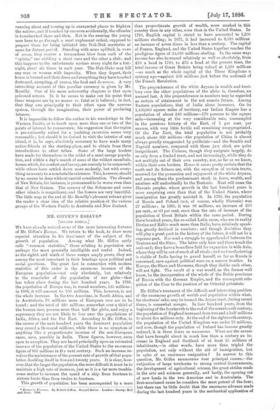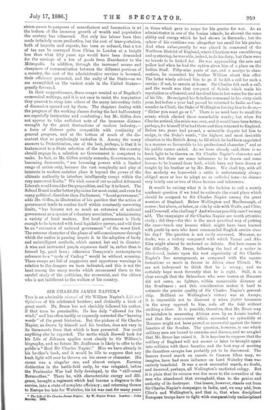MR. GIFFEN'S ESSAYS.* [SECOND NOTICE.] WE have already noticed some
of the more interesting features of Mr. Giffen's Essays. We return to the book, to draw more especial attention to his treatment of the subject of the growth of population. Among what Mr. Giffen aptly calls "common statistics," those relating to population are perhaps the most generally intelligible and useful Indeed, as the eighth and ninth of these essays amply prove, they are among the most important in their bearings upon political and social questions. The great fact in connection with modern statistics of this order is the enormous increase of the European population—not only absolutely, but relatively to the remainder of the population of our globe—that has taken place during the last hundred years. In 1788, the population of Europe was, in round numbers, 145 millions ; in 1888, it will amount to 350 millions. This, however, is not the whole increase. In the two Americas, in South Africa, and in Australasia, 70 millions more of European race are to be found ; and the total of 420 millions, somewhat over a third of the human race, possess more than half the globe, and enjoy a supremacy they are not likely to lose over the populations of India, Africa, and the Far East. According to Mr. Giffen, in the course of the next hundred years the dominant population may exceed a thousand millions, while there is no symptom of anything like a proportionate increase of the non-European races, save, possibly in India. These figures, however, seem open to exception. They are based principally. upon an estimated increase of the population of the United States to the enormous figure of 800 millions in tise next century. Such an increase in- volves the maintenance of the present rate of growth of that popu- lation doubling itself in five-and-twenty years. It is clear, how- ever, that the larger the population, the more difficult it must be to maintain a high rate of increase, just as it is a far more trouble- some matter to increase the speed of a ship from fourteen to sixteen knots than from twelve to fourteen.
This growth of population has been accompanied by a more
• Baser in Finance. By Robert Giffen. Second Series. London: George Bell
and Sons. 1886.
than proportionate growth of wealth, more marked in this country than in any other, even than in the United States. In 1788, English capital is stated to have amounted to 1,200 millions sterling; in 1875, it had increased to 8,500 millions an increase of seven times in less than a century. The capital of France, England, and the United States together reaches the prodigious figure of 24,000 millions sterling. In the same way, income has also increased relatively as well as absolutely, from 216 a head in 1788, to 235 a head at the present time, the total income of Great Britain being valued at 1,200 millions —as much as the whole capital of the Three Kingdoms a century ago—against 200 millions just before the outbreak of the French Revolution.
The preponderance of the white Aryans in wealth and terri- 'tory over the other populations of the globe is, therefore, an assured fact. A like preponderance in numbers may be regarded as certain of attainment in the not remote future. Among Eastern populations, that of India alone increases. On its 1,400,000 square miles of territory, our Indian Empire has a population of about 240 millions-170 persons to the square mile—increasing at the very considerable rate, unexampled in the previous history of the East, of 1 per cent, per annum, with very little fertile soil remaining unappropriated. Of the Far East, the total population is not probably much above 300 millions—the population of China is almost always greatly exaggerated by publicists—and the Semitic and Negroid numbers, compared with those just cited, are quite insignificant. The Chinese, though they emigrate largely, do so only from a limited tract, and not increasingly, while they do not multiply out of their own country, nor, as far as we know, within their own borders. Hence it seems pretty certain that the earth and its fulness are, with the exception of certain tracts, reserved for the possession and enjoyment of the white Aryans, and among these the predominant stock in force, wealth, and numbers will undoubtedly be the Teutonic. Next will come the Slavonic peoples, whose growth in the last hundred years is more surprising even than that of the United States, where immigration has greatly assisted it. In 1788, the population of Russia and Poland (not, of course, wholly Slavonic) was 27 millions ; in 1885, it was 98 millions, an increase of 260 per cent., or 60 per cent, more than the rate of increase of the population of Great Britain within the same period. During these hundred years, the so-called Latin races, who are in reality Iberian and Keltic much more than Italic, have, relatively speak- ing, greatly declined in numbers ; and though doubtless they will play a great part in the history of the future, it will not be a supreme part. Nor need a struggle be apprehended between the Teutons and the Slays. The latter only here and there touch the seaboard; they have a boundless field for expansion in wide Asia, where they will be out of reach of all rivals ; and no foreshadowing is visible of India having to guard herself, so far as Russia is concerned, save against political wars on a narrow frontier. In Europe, the Slays and Germans, though they dislike each other, will not fight. The result of a war would, as the former well know, be the incorporation of the whole of the Baltic provinces of Russia with the German Empire, and the consequent rele- gation of the Czar to the position of an Oriental potentate.
Mr. Giffen's treatment of the difficult and interesting problem of the enormous growth of wealth and population within what, for shortness' sake, may be termed the Aryan tract, during recent times, is somewhat meagre. In four hundred years, from the beginning of the fourteenth to the end of the seventeenth century, the population of England increased from two and a half millions to about five millions only. At the end of the eighteenth century, the population of the United Kingdom was under 13 millions, and now, though the population of Ireland has become greatly reduced, it is three times as numerous. What are the causes that have brought about in much less than a century an in- crease in England and Scotland of at least 25 millions of inhabitants,—in other words, have more than tripled the population, not only without the aid of immigration, but in spite of an enormous emigration P In answer to this question, Mr. Giffen enumerates four principal causes,—the subjection of large territories to strong central Governments, the development of agricultural science, the great strides made in the arts and sciences generally, and lastly, the opening out of new lands in the two Americas and in Australasia. The first-mentioned cause he considers the most potent of the four; but there can be little doubt that the enormous advance made during the last hundred years in the mechanical application of steam-power to purposes of manufacture and locomotion is at the bottom of the immense growth of wealth and population the century has witnessed. Not only has labour been thus made infinitely more productive, but the cost of transportation, both of imports and exports, has been so reduced, that a ton of tea can be conveyed from China to London at a freight less than what fifty years ago would have been demanded for the carriage of a ton of goods from Manchester to the Metropolis. In addition, through the increased means and cheapness of communication between the different portions of a country, the cost of the administrative services is lessened, their efficiency promoted, and the unity of the State—as we see exemplified on the vastest scale in the United States— greatly favoured.
In their suggestiveness, these essays remind us of Bagehot's economical writings, and it is not easy to resist the temptation they present to stray into others of the many interesting fields of discussion opened out by them. The chapters dealing with the progress of the working classes during the last half-century are especially instructive and comforting ; but Mr. Giffen does not appear to take sufficient note of the immense distress wrought by the great fluctuations of modern industry,— a form of distress quite compatible with continuity of general progress, and at the bottom of much of the dis- content that so perplexingly underlies it. Among the many answers to Protectionism, one of the best, perhaps, is that it is tantamount to a State selection of the industries the country should engage in, a selection no Government is competent to make. In fact, as Mr. Giffen acutely remarks, Governments, in becoming democratic, " are becoming powers with a limited range of action only, because the vast complexity and play of interests in modern societies place it beyond the power of the ultimate authority to interfere intelligently except within the very narrowest limits." We wish some of our so-called Advanced Liberals would consider the proposition, and lay it to heart. The School Board is afar better physician for most social, and even for many political, disorders than Parliament. "Local government," adds Mr. Giffen, in illustration of his position that the action of government tends to confine itself within constantly narrowing limits, "has become not _so much an extension of national government as a species of voluntary association," administering a variety of local matters. But local government is likely enough to be invested with local legislative powers, and will then be an "extension of national government" of the worst kind. The extreme character of the phase of self-consciousness through which the nation is passing impels it to the adoption of hasty and unintelligent methods, which cannot but end in disaster. A wise and instructed people expresses itself in, rather than is formed by, good laws ; otherwise Tennyson's contemptuous reference to a "cycle of Cathay" would be without meaning. These essays are full of suggestive and opportune warnings in relation to the dangers we have indicated, and this is not the least among the many merits which recommend them to the careful study- of the politician, the economist, and the citizen who is not indifferent to the welfare of his country.



































 Previous page
Previous page